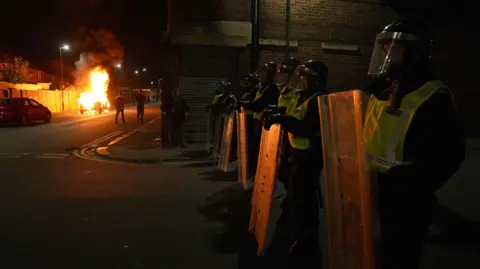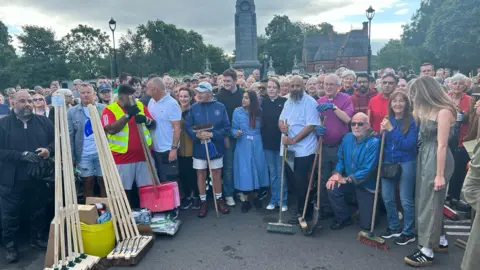Riots meant 'I didn't go outside with my hijab'
 BBC
BBCAn asylum seeker says she stockpiled three weeks’ worth of food because she was too afraid to leave her home following riots which broke out after the fatal Southport knife attack in the summer.
The woman, who the BBC has agreed to call Malali to protect her safety, moved to the north-east of England from Afghanistan earlier this year so her daughter could receive an education.
She said the unrest had been "difficult to accept", as it was not the "normal feeling" she had experienced since moving to the region.
A report by the Newcastle-based charity Action Foundation has found 58% of asylum seekers and refugees in the North East felt personally affected by the riots.
Hundreds of people were involved in a night of violence in Sunderland city centre on 2 August, with police officers attacked and buildings set on fire.
It was one of many far-right protests and riots that took place across the UK, including in Hartlepool and Middlesbrough.
 PA Media
PA MediaDuring this period Malali tried to leave her home as little as possible, saying she felt her hijab made her more of a target.
Taking her son to an urgent dental appointment, she wore a hat "and used a hoodie to cover my hair, even though it was summer", she said.
"I didn’t go outside with my hijab."
She thought it would make people notice she was "an outsider, a refugee", she said.
The charity's report revealed many refugees and asylum seekers adjusted their daily routines, avoided certain areas and postponed appointments.
CEO Duncan McAuley said while the report was "tough reading", there was also a "sense of solidarity" evident in it.
"Lots of the respondents talked about the amazing turnout the following day of people cleaning up," he said.
They also mentioned "people on the streets demonstrating against racism", he added.

Northumbria Police and Crime Commissioner Susan Dungworth said she was confident "we can ultimately build stronger communities following these events".
She has launched a new round of funding for community groups to enable projects tackling hate crime and improve community cohesion, she said.
Follow BBC North East on X (formerly Twitter), Facebook and Instagram. Send your story ideas to [email protected].
